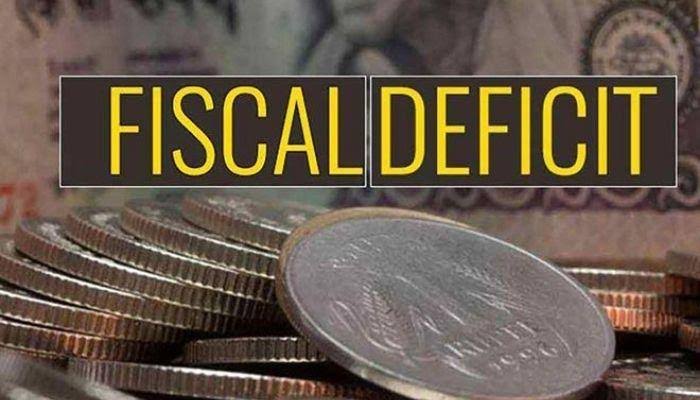[ad_1]

An economic analyst, Ignatius Igala, has said that Nigeria’s N7 trillion fiscal deficit as of the third quarter of 2024 raised concerns about economic stability of the country.
In an interview with New Telegraph over the weekend, he listed Nigeria’s fiscal deficits over some years as: (2020) N6.1 trillion (3.39% Gross Domestic Product (GDP); (2021) N5.6 trillion (3.23% GDP); (2022) N7.3 trillion (3.9% GDP); (2023) N6.9 trillion (3.5% GDP) and (2024), N7.05 trillion (3.7% GDP).
He said for Nigeria’s 2025 budget, the Federal Executive Council approved a proposed budget of N47.9 trillion, representing a 35 per cent increase from the 2024 total budget.
He added that the budget included a non-debt recurrent expenditure of N9.92 trillion, capital expenditure of N7.72 trillion, and debt service of N8.24 trillion.
He noted that the projected GDP growth rate for 2025 is 4.6 per cent, with an expected crude oil price of $75 per barrel and exchange rate of N1,400/$1. He warned that budget deficits led to inflation, increased borrowing costs, and reduced investor confidence.
He noted that its implication was that government spending exceeds revenue, and that it is accumulating debt.
He added that budget deficits hindered economic growth, adding that Nigeria’s budget deficit stifled growth between 1981 and 2021 and so there became the need for deficit reduction.
He added that high deficits undermine Nigeria’s long-term economic prospects. He identified deficit financing effects to include inflation, adding that excessive money printing increases inflation.
He also said there would be crowding out as government borrowing reduces private sector investment. He also said that there would be a debt burden, adding that rising debt servicing costs divert funds from essential services.
The analyst said that in Q3’23, deficit narrowed 11.9 per cent and 12.9 per cent vs. Q2’23 and programme target. He said the N7 trillion deficit signalled a pressing need for fiscal adjustment.
Igala urged the government to adopt fiscal discipline by reducing unnecessary expenses, enhancing revenue collection; invest in human capital through education and healthcare for long-term growth as well as infrastructure development by strategic investments in transportation, energy and agriculture.
He also called for reduction on non-essential expenses; enhancement of tax collection efficiency; promotion of private sector investment; diversification of revenue streams and implementation of structural reforms.
He identified challenges to include revenue shortfalls given dependence on oil exports; corruption which he noted diverts funds and undermines economic growth.
Warning that insecurity discouraged investment, the analyst identified opportunities to include diversification through the development of non-oil sectors; privatisation, which he said entailed efficient management of state-owned enterprises; and foreign investment resulting in attraction of foreign capital.
Figures disclosed by President Bola Ahmed Tinubu during his presentation of the 2025 Budget of Restoration to the National Assembly on December 18, 2024 showed that Nigeria’s fiscal deficit had hit N7.05 trillion by the end of the third quarter of 2024.
It was observed that the deficit rose from the difference between the country’s total revenue and expenditure for the year so far as the government’s continued reliance on borrowing to bridge funding shortfalls amid ambitious spending plans.
Tinubu presented a budget of N47.9 trillion in 2024 with a N34.8 trillion revenue projection, clearly showing a fiscal deficit of N13.1 trillion.
The President stated that N14.55 trillion in revenue had been generated as of Q3’24, representing 75 per cent of the annual target, while government expenditure for the same period stood at N21.60 trillion, accounting for 85% of the budgeted spend, leaving a fiscal gap of approximately N7 trillion.
He said the economy grew by 3.46 per cent in Q3’24, compared to 2.54 per cent in Q3’23; foreign reserves stood at $42 billion.
Igala said: “In terms of Nigeria’s 2025 budget, the Federal Executive Council approved a proposed budget of N47.9 trillion, representing a 35% increase from the 2024 total budget.
The budget includes a non-debt recurrent expenditure of N9.92 trillion, capital expenditure of N7.72 trillion, and debt service of N8.24 trillion.
It has projected GDP growth rate for 2025 is 4.6%, with an expected crude oil price of $75 per barrel and exchange rate of N1,400/$1. “Nigeria’s N7 trillion fiscal deficit demands urgent attention.
Fiscal discipline, human capital investment, and infrastructure development can mitigate adverse effects and foster sustainable growth.
“There is the need to reduce non-essential expenses; enhance tax collection efficiency; promote private sector investment; diversify revenue streams and implement structural reforms.”
He said that for future outlook, addressing Nigeria’s fiscal deficit required long-term planning; policy consistency, transparency and accountability.
“Nigeria’s N7 trillion fiscal deficit demands urgent attention. By adopting fiscal discipline, investing in human capital, and promoting infrastructure development, Nigeria can mitigate the adverse effects of deficit budgeting and foster sustainable economic growth.
“By learning from past deficit budgets and adopting sustainable fiscal practices, Nigeria can achieve economic stability and growth,” Igala concluded.
Please follow and like us:
Related
[ad_2]
Source link


